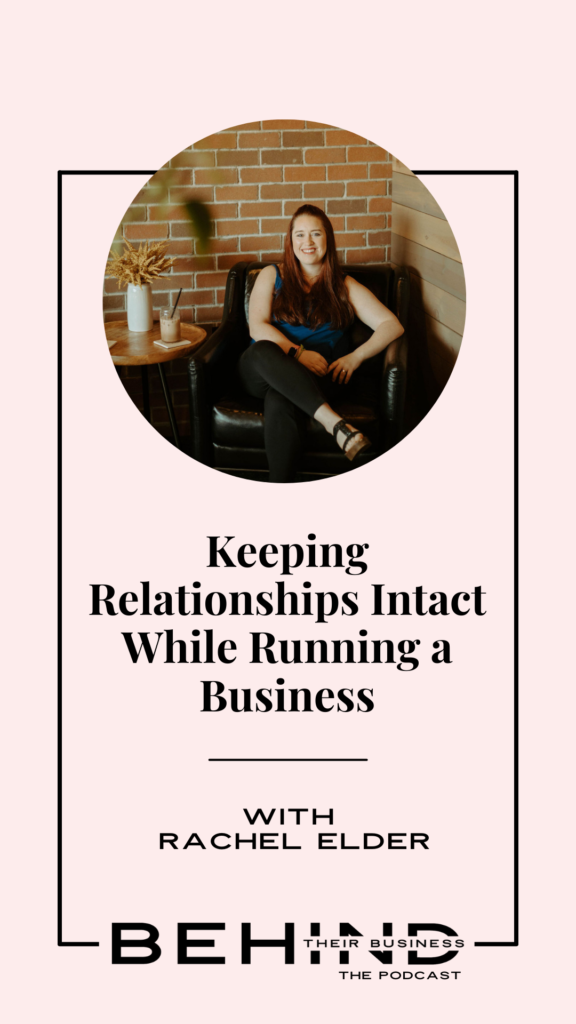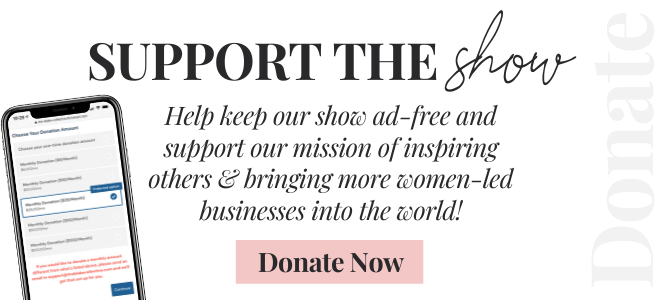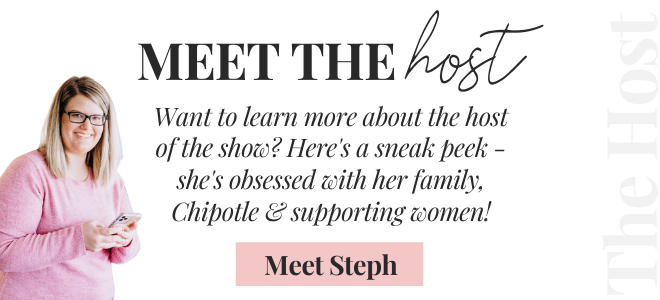WORKSHOP
Free
In this LIVE training, you'll learn the exact system to work less than 20 hours per week and make 6+ figures in one year with 1 team member & no ads.
Keeping Relationships Intact While Running a Business with Rachel Elder
March 7, 2022
Where were you before you started your business? Why did you decide on this type of business and how did your relationship factor into it?
Rachel: I started my career as a mental health therapist while working for a community mental health agency. I was also doing a few different networking marketing companies at the same time. I eventually decided to venture into private practice which means owning my own therapy business and seeing individuals and couples within that field.
Just recently, I’ve added in the relationship coaching aspect as well, which means I’m running two businesses right now, all on my own while building a team and maintaining my family and marriage.
Can you explain a little more about what community mental health is?
Rachel: Community mental health is typically the beginning move for people who graduate with their master’s in counseling or psychology. What that means is that you are typically working with low income, Medicaid, Medicare clients.
I was working with children and adolescents; so I was going into the school systems and providing therapy at school for students working with school counselors and teachers to help with some of the engagement of the school but I was also helping those students process life, depending on what they were going through.
We did interactive activities as therapy, so we did some extreme sports, such as horseback riding, learning how to rollerblade, hiking, and so forth. I live in Seattle, so we went on hikes up Mount Rainier, and around the area.
We also did some nature processing therapy.
Can you explain a little bit about your family and how they factored into this? Did you meet your husband when you started your business? How does that all play together?
Rachel: I met my husband on the first day of Graduate School. He wasn’t a therapist himself, but I was new, having just moved from Indiana to Seattle to pursue my graduate degree. I was brand new to a city I’ve only ever visited, and I had a friend who kept saying that I needed to get out and date.
My friend helped me create a dating profile and I met my husband out of it.I’m really grateful for my relationship because I know that a lot of relationships ended because the graduate school journey required a lot of personal therapy and a lot of unraveling to help you build your ability to be a therapist.
As people do that, they leave parts of themselves that don’t serve them well anymore. They discover new parts of themselves and their relationships sometimes don’t journey with them.
So with that said, I always said that we made it through graduate school together, then we’re set for life.
Can you share a little bit about at what stage in your relationship you decided to start your business and how that kind of influenced things in your relationship?
Rachel: I started my own therapy practice in 2018. I graduated in 2017 with my Masters, got married the day after and then six months later decided to do the therapy business.
I was working community mental health full time and then doing one day a week of private practice on my own. Three months into that, I decided to join a group practice, and three months after that, I shut down my private practice because I thought I couldn’t do both simultaneously.
A year later, I left community mental health, put in my notice, and then two weeks later, found out I was pregnant. I worked for the group practice primarily, which meant working with other therapists under their business.
Before going on maternity leave, I decided when I returned from my leave, that I was going to open my own private practice again.I went on maternity leave at the end of 2019, and took about a month off.
I then opened my private practice one day a week, which eventually grew to three days a week about six months after having my little one. I am now working four days a week in my therapy practice, as well as coaching, and it’s been two years since then.
I now have a 2-year-old so it’s been a little bit of a wild and a lot of shifting transitions for the last five years.
Do you have any tips or advice that that that you can share from your own journey that you went through that might help others in similar situations?
Rachel: It hasn’t been perfect from day one. I’ve made a lot of mistakes and I think the most important thing is that I’ve learned from them. Instead of letting those mistakes keep repeating when they happen, I’ve taken that time to reflect and thought, “OK, why did this happen? Why did it play out the way it did? Where’s the breakdown?”
So, going back to the MLM days, I just decided to do those on my own and I always anticipated that my husband was going to say no. So, I came in very forcefully like “This is what I’m doing. Therefore I want to do it and you can’t talk me out of it.”
Now you can probably go into that foreshadowing and that doesn’t really work very well when you’re starting a business of any kind and just kind of telling your partner “Get on board or leave me alone.”
That’s not healthy, so we did a lot of trial and error with that kind of process, and I finally got to the point where I would have to go to him and say “
For some reason, I’m fearful that you’re going to say no to me about this. I want to talk to you about why this is important to me, my thoughts around it, and then I want to hear your thoughts too.” It took a lot of work for me to get to that point of actually being open to hearing his thoughts.
We have to take a step back and tell ourselves that it’s not always going to be this way. Maybe there’s a pattern or a theme that shows up that we can work on.
Just because he told me “No” that one time doesn’t mean that he’s going to tell me “No” all the time.
“We have to take a step back and tell ourselves that it’s not always going to be this way.”
With ultimately having a dialogue and a conversation, I the other piece I’ve learned is sometimes I just want the conversation to happen in one sitting and be done. What a person must remember is that a lot of the conversations, especially building a business, is an ongoing conversation, and you have to embrace that mindset from the beginning.
If you’re not talking, you will have problems. You’ll feel disconnected. You have to have open communication. You have to have conversations and dialogue about what’s happening in your life, whether they’re involved in your business or not.
They’re still supporting you. They’re still observing how it impacts you. I want him to be cheerleading me along the way but I can’t expect him to be my cheerleader if he has no idea what’s going on.
After you had your child, how did that affect your business and your relationship?
Rachel: You really have to embrace a trial-and-error mindset when you’re in a relationship. One, because you’re meant to evolve and grow, both of you individually and together.
There’s a quote that I love that says something like “When you become a parent, you take on a new identity and you lose some of your identity”; I really struggled with that in the beginning.
I didn’t want to be a stay-at-home mom. I love my daughter and I love my work, but I pushed hard to go back to work a month later. I would never repeat or suggest that to anyone, but I did that.
I had a sense of energy that I needed to work to have a sense of myself where I don’t get lost in being a mother. My husband got to go to work every day and I didn’t resent him, but I was envious.
I was mad that he got to leave every day and interact with people even though they weren’t people I would want to interact with it. There were conflicts that happened as well so I kind of threw myself into work instead of slowing down and thinking on how those conflicts were being activated or triggered.
I didn’t understand what was happening, so I just poured myself into work instead of what wasn’t working within our life. It took a long time for me being able to get to the place of naming what I needed.
From a professional perspective, do you have any advice for people who are struggling and who aren’t in a good spot in their relationship and yet don’t see a way out?
Rachel: I would encourage anyone to get a pen and paper and start with what you want to stop doing or experiencing. For me, it was the fact that I wanted to date again. I wanted to be courted. I wanted to stop feeling like I was the last priority within the relationship.
Sometimes it’s easier to start there, but then if you start with the things that are negative or that you want to stop, then what would be the opposite of that? What’s the positive need or the positive change?
It’s sometimes hard to name the positive need or the positive change you want, and most of the time we go in with the criticism of doing all the chores such as laundry. Well, when you criticize your partner, they may get defensive and they’re not going to hear what you want.
But when you say that you’re really stressed and overwhelmed, that you need help, your partner’s going to understand how you feel and that you need help. I think what happens is sometimes you might feel like you’re fine, that your partner needs to change, but it’s a relationship, so you both need to change.
You can’t wait on the other person to change first, so you change. You have to decide what you’re willing to do, and they have to decide what they’re willing to do.
You don’t get to wait around for them to make the change. That’s not how that works.
“Really focus on what is sustainable, especially if you’re in a new business, parenting or new life transition.”
For example, one week, I might focus on more gratitude towards my partner, so I don’t only see what they’re doing wrong. Then another week, I’m going to sit down and schedule out date nights with my partner because that’s what I can do.
Breaking it down into smaller steps and then building as you integrate different things into your relationship. Then I would encourage you to give yourself the mindset of at least six months to pour into this and really try to change.
The other area I see people fail in is mapping it all out and saying that they’ve tried it for one week and it didn’t work. It won’t work. It took time to get to this place.
It’s going to take time to get out of it. Six months isn’t always the answer, but usually within six months you’re going to see some change in progress happen.
And it’s easier to make more change in progress happen when you’ve seen a little bit happen. It builds upon that and the motivation continues.
Habits take 21 days to form, so one week of trying to communicate well is not going to shift a whole year of not communicating or a whole decade of not communicating well.
There’s this balance of being realistic of what needs to happen, where you’re at to get you to where you want to go, and then creating a sustainable action plan to get there.
“There’s this balance of being realistic of what needs to happen, where you’re at to get you to where you want to go, and then creating a sustainable action plan to get there.”
If you want your business to thrive, you’ve got to identify the people in your life who are going to support you. You must prioritize those relationships.
So for me and I know it helps that I’m a couples therapist and relationship coach, but if I’m not having a healthy marriage, I have no right to be helping other people have a healthy marriage. Your husband is a partner for you so it’s important to prioritize your relationship as much as you prioritize your business so that you really are thriving and healthy in all the areas of your life!
CONNECT WITH RACHEL ELDER
RESOURCES MENTIONED



